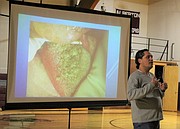Statewide campaign fights tobacco and e-cigarettes
Ronnie Trentham stood in front of a gym full of junior high and high school students and explained why he no longer has a jaw bone. His face now deformed as a result of oral cancer caused by using chewing tobacco. It was a part of “Kick Butts Day,” a nationwide event to raise awareness on the problems caused by tobacco use.
Trentham started to use chewing tobacco when he was a sophomore in high school, unaware of the dangers it would cause him later in life. He is a seven-time cancer survivor and said he fought the disease for the love of his wife and two daughters. Occasionally he would pause from his presentation and put a liquid in his mouth. Since he no longer has saliva glands, his mouth would get dry and he needed the specially formulated drops.
Current statistics from the Montana Youth Risk Behavior Survey indicate that although smoking among teens has dropped to a low of 12.1 percent, use of e-cigarette devices has soared to 22.5 percent. Chewing tobacco use has remained steady at around 14 percent for Montana teenage males, which is higher than the national average of 9 percent.
“Montana always ranks high in use rates of tobacco products. This is not surprising when tobacco companies spend 31.3 million dollars a year marketing tobacco products in Montana. Much of this money is directed at teens and young adults, encouraging use which can lead to a lifetime addiction to nicotine,” it was stated in a recent press release from Barb Jasper, who works for the Tobacco Prevention Program at the Mineral County Health Department.
Trentham and Greg Bilby are a part of a Tobacco Tour. Both are from Oklahoma and speak across the nation about the dangers of tobacco use. Bilby, is a member of the Cherokee Nation and started with the tour 10 years ago, “to help people make good decisions, and to encourage them to use their gifts and talents to make the world a better place.”
E-cigarettes were invented in 2003 by a Chinese pharmacist and most are made in China. They exploded onto the market in 2004 and their global use has risen exponentially. They are devices that heat a liquid into an aerosol that the user inhales.
With hundreds of flavors, many targeted toward teens, like bubble-gum, cherry, and chocolate. Almost all of them contain nicotine and other cancer causing agents including formaldehyde, arsenic, aluminum, and lead, according to literature from the Montana Department of Health and Human Services.
There are a number of devices including vape pens, pod mods, vaporizers, cig-a-likes, e-cigars, e-pipes, e-hookahs and JUULs (which look like a flash drive and do contain nicotine). When they first came onto the market, e-cigs were not regulated by the U.S. Food and Drug Administration (FDA), and the amount of nicotine they contain varies among brands. This results in users not really knowing the actual dose of nicotine they are getting.
However, 99 percent of e-cigs do contain some proportion of nicotine which is a highly-addictive drug. Companies that sell e-cigarettes market their product as a safe alternative to smoking regular cigarettes and helps people quit smoking. However, this has not been proven and so far research has shown that after a short time from switching to e-cigarettes, a person begins to use both traditional and e-cigs. Research also shows that teens who use them are more likely to start smoking regular cigarettes.
“It’s not rocket science,” said Trentham. “Any time you heat a chemical and breathe that into your lungs, it’s not going to be good!”
Toward the end of the presentation, which was held at all three Mineral County Schools in St. Regis, Superior and Alberton, Bilby showed some gruesome photos of what oral cancer can do to a person. Including large, cancerous sores, rotting teeth, and growths on the taste buds of a person’s tongue and throat.
“It took a long time for Americans to find out how bad smoking and chewing is,” said Trentham. “It took years to see the results. So, with e-cigarettes we know they’re bad but we still don’t know all of the effects and we won’t for years.”



